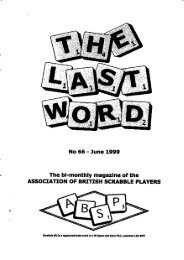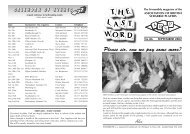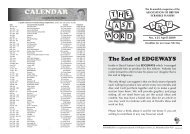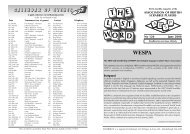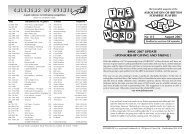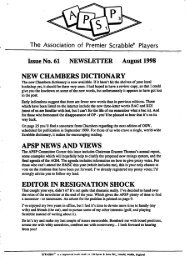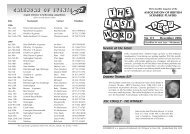TLW96 - Nomads Results
TLW96 - Nomads Results
TLW96 - Nomads Results
Create successful ePaper yourself
Turn your PDF publications into a flip-book with our unique Google optimized e-Paper software.
Scrabble Books<br />
How to Win at Scrabble, by Andrew Fisher and David Webb.<br />
ISBN: 0-7134-8820-4<br />
Published by B T Batsford, an imprint of Chrysalis Books<br />
Recommended price: £12.99<br />
The publisher’s summary describes the book thus:<br />
Scrabble is basically a straightforward game. The<br />
strategy used by top players can be easily understood<br />
and adopted by average players. Written by two<br />
international experts of the game, How to Win at<br />
Scrabble, for the first time, aims to describe in a<br />
readable and entertaining fashion the experts’ strategies and<br />
techniques for winning at Scrabble. Their advice gives even Sunday afternoon<br />
players the chance to be the best.<br />
About the Authors<br />
Andrew Fisher and David Webb are two of the most successful tournament<br />
players in the UK, and have been involved in competitive Scrabble at the highest<br />
level for over a decade. They have represented England at the World Scrabble<br />
Championships on several occasions, and also competed at the World<br />
Championships in Las Vegas in 2001.<br />
Andrew lives in Melbourne, Australia and David lives in Harpenden,<br />
Hertfordshire.<br />
Graeme Thomas writes:<br />
This is a long-awaited book on Scrabble techniques, by two of the game’s best players. As<br />
the authors point out much of this material has been available in specialist magazines, but<br />
never in book form like this. The book is eleven chapters and 160 pages long, but it is<br />
crammed with useful techniques.<br />
Chapter one is the introduction. It claims that the book is aimed at all levels of player, but<br />
I feel that the complete novice may start to become overwhelmed early on. The true<br />
market is, I feel, the player of middle or higher ability who wants to improve. But there is<br />
help for the novice, if he or she can stand the pace.<br />
Chapter two describes the words used in the game, and outlines the scale of the problem<br />
of learning them all. Short sections describe the relative advantages and disadvantages<br />
of the words of each length. This is followed by a description of hooks — what are they,<br />
and why are they important? Finally, a summary gives a suggested order for learning<br />
words.<br />
Chapter three tells how to learn words. Various techniques are given, and the merits of<br />
each are noted. This is the heart of the book. The rest of the book is important, but all of<br />
the methods described there rely on a massive vocabulary, and there is really no substitute<br />
4<br />
for learning the words. But studying this chapter should, at least, make the job a little<br />
easier.<br />
Chapter four, on strategy, is a bit of a mixture, as it covers a lot of ground. The section on<br />
“key factors” is worth the price of the book on its own. The section on defence is well<br />
worth a read, too. The authors recommend paying little attention to defence. If this view<br />
becomes more widespread, perhaps we’ll have few dull games of attrition.<br />
Chapter five covers the endgame. The authors point out that it is here that many games<br />
are won or lost, and so they devote a separate chapter to it, even though it is really part of<br />
“strategy”. Many of the concepts discussed here are simple in theory, but hard to apply<br />
properly in practice. The guidance offered here is sound.<br />
Chapter six is on the mental approach. It tends, at times, to approach the<br />
metaphysical, but the underlying theme is clear. A positive mental attitude, especially<br />
when circumstances appear to be conspiring against you, is vital for performing at<br />
your best.<br />
Chapter seven is about improving your game. The key to improvement is to measure your<br />
performance, and then see how much those measurements improve over time. Various<br />
measurement methods are given, and they’ll all lead to improved play.<br />
Chapter eight is about resources and equipment. It details where to buy the tournamentquality<br />
equipment that makes playing so much easier. The section on tile bags is<br />
particularly impassioned.<br />
Chapter nine tells us about competitive Scrabble, from clubs to the World Championships.<br />
The club and tournaments described are the UK ones.<br />
Chapter ten is a detailed analysis of a game from the 1999 World Championships, between<br />
Mark Nyman and Joel Wapnick. It was chosen because it illustrates the points made in the<br />
previous chapters.<br />
Chapter eleven is the conclusion. I quote, in part:<br />
The primary reason your authors play Scrabble is for the pleasure and fun it<br />
brings. We also found that the better we got, the more fun we had.<br />
Competitive Scrabble also gave us excitement, a sense of achievement, and a<br />
modicum of prize money, not to mention friendship with people from around the<br />
world who share our passion for the game.<br />
That’s what the book is all about — fun and excitement.<br />
Finally, the authors stoop to bribery:<br />
If any of our readers have been inspired by this book to enter a tournament in<br />
which your authors are also competing, please feel free to make yourself known<br />
to us. We would be delighted to hear of your progress, and one of us(!) will<br />
gladly buy you a drink.<br />
The book concludes with a glossary, several appendices, and an index.<br />
This book is an excellent description of the way to improve at Scrabble. It will take a great<br />
deal of hard work to achieve mastery, but more modest efforts will still yield improvements.<br />
I have no hesitation in recommending it to anyone who wants to get better.<br />
5



